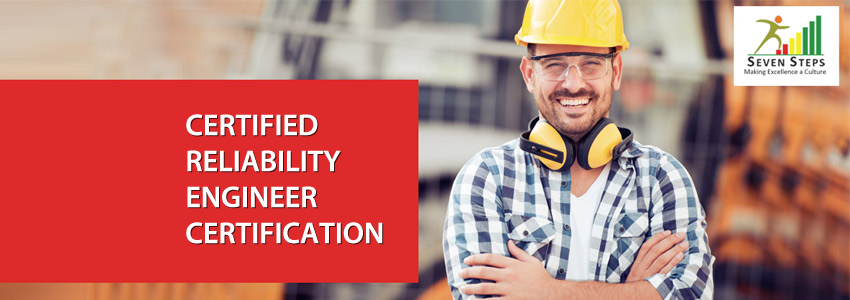Reliability Engineer is a professional who has sound knowledge and understanding of principles of performance, evaluation and prediction to improve product and systems safety, reliability and maintainability.
There are various institutes which offer training and certification across the world. There are also educational institutions which offer Reliability engineering course in post-graduation level.
Which course to choose depends on some of the following criteria.
- If you are a student who wants prior qualification before starting career, joining full time course might be preferred.
- If you are a professional working in organizations which gives importance to reliability or you would like to get additional qualification for career growth, then certifications from reputed and globally recognized institution would be a preferred choice.
Key steps in getting Reliability engineer Certification
- Understand and find the requirements and exam specifics for a Certified Reliability Engineer.
- Go through the syllabus and BOK. Reviewing study guides and mock exam papers can be referred.
- Get training from reliable academy and training centre like Seven Steps Academy. Alternatively, self-study can also be done but it can take long time for preparation.
- Do online application for exam from ASQ
- Write the exam and pass them exam with prescribed marks for qualifying exam which is usually 70%.
Seven Steps Academy of Excellence is the learning and development arm of Seven Steps Business Transformation Systems dedicated to research,training and development in the area of Business Excellence.
It offers more than 100 experiential learning modules in the areas of Lean, TPM, TOC, TQM, Quality Management Systems & Six Sigma. It also provides Industry specific and approved training programs for Engineering, Automotive, Retail, Aerospace, Healthcare, Hospitality, IT and Process Industries.
Related Article– How operational excellence through Lean, TQM, TOC and 5S help organisations improve performance?
(Seven Steps Academy is an official training partner for ASQ India)
Program Highlights
Training Certificate from ASQ SouthAsia.
ASQ approved trainers.
ASQ CRE hand book and Training Notes.
Course Duration–8 days
Weekend Classes (Saturday & Sunday: 9:30AM-5:30PM)
Venue: Seven Steps Academy of Excellence; Bangalore
Key takeaways and learnings from the training
▪ Demonstrate an understanding of the concepts of reliability engineering.
▪ Measure model times to failure using the appropriate probability distribution.
▪ Demonstrate an understanding of the relationship between the time to failure distribution, the reliability function, and the hazard rate.
▪ Determine a life test, estimate reliability values from the test data, and set confidence limits on the results.
▪ Use the design tools necessary to ensure a reliable product including prediction, allocation, and FMEA.
▪ Understand the differences in analyzing the reliability of a repairable and a non-repairable system.
Some of the topics of interest from this programme are:
- Benefits of Reliability Engineering,
- Interrelationship of Safety, Quality and reliability
- Leadership responsibilities of Reliability Engineer
- Roles and responsibilities of reliability engineer in the product life cycle
- Function of reliability in engineering
- Ethics in reliability engineering
- Supplier reliability assessments
- Reliability terminology basics
- Drivers of reliability requirements and targets
- Corrective and preventive actions
- Root cause analysis
- Product lifecycle engineering stages
- Economics of product maintainability and availability
- Cost of poor reliability
- Quality triangle
- Six Sigma methodologies
- Systems engineering and integration
- Risk management Techniques
- Types of risk
- Failure Tree Analysis – FTA
- FMEA – Failure modes and effects analysis
- Common mode failure analysis
- Hazard Analysis
- Risk Matrix
- System Safety
- Strategies to minimize risk
- End of life considerations
- Product improvement
Apart from this, the following topics are also covered
- Basic concepts of Probability and statistics for reliability
- Data management
- Reliability planning, testing and modelling
- Lifecycle reliability which includes reliability design techniques, parts and systems development and maintainability.
ASQ Certified Reliability Engineer (CRE) Training Details:
Fee Structure / Venue / Duration & Class timing
Fee Structure:
- Training Fee Rs. 27,500 plus 18% GST (Rs. 32,450)
- Discount of 5% for ASQ Members and another 5% for a group of two or more.
- On completion of Training, you will get the CRE Training Certificate from ASQ India.
Seven Steps Academy of Excellence conducts Certified Reliability Engineer course in Bangalore in association with American Society for Quality – ASQ. Training certification and registration for the course is done through ASQ South Asia. The course content is in line with latest Body of Knowledge from ASQ.
Our Team has consultants and practitioners in the field of Lean manufacturing, Lean Six Sigma, Total productive maintenance, Total Quality Management, Lean layout consultants. We operate all over India and having branches in Bangalore, Chennai, Mysore, Hosur, Pune and have customer base in Delhi, Calcutta, Gurugram, Neemrana, Pant Nagar, Nashik, Pune, Hyderabad, Vishakapatnam, Vijayanagaram

